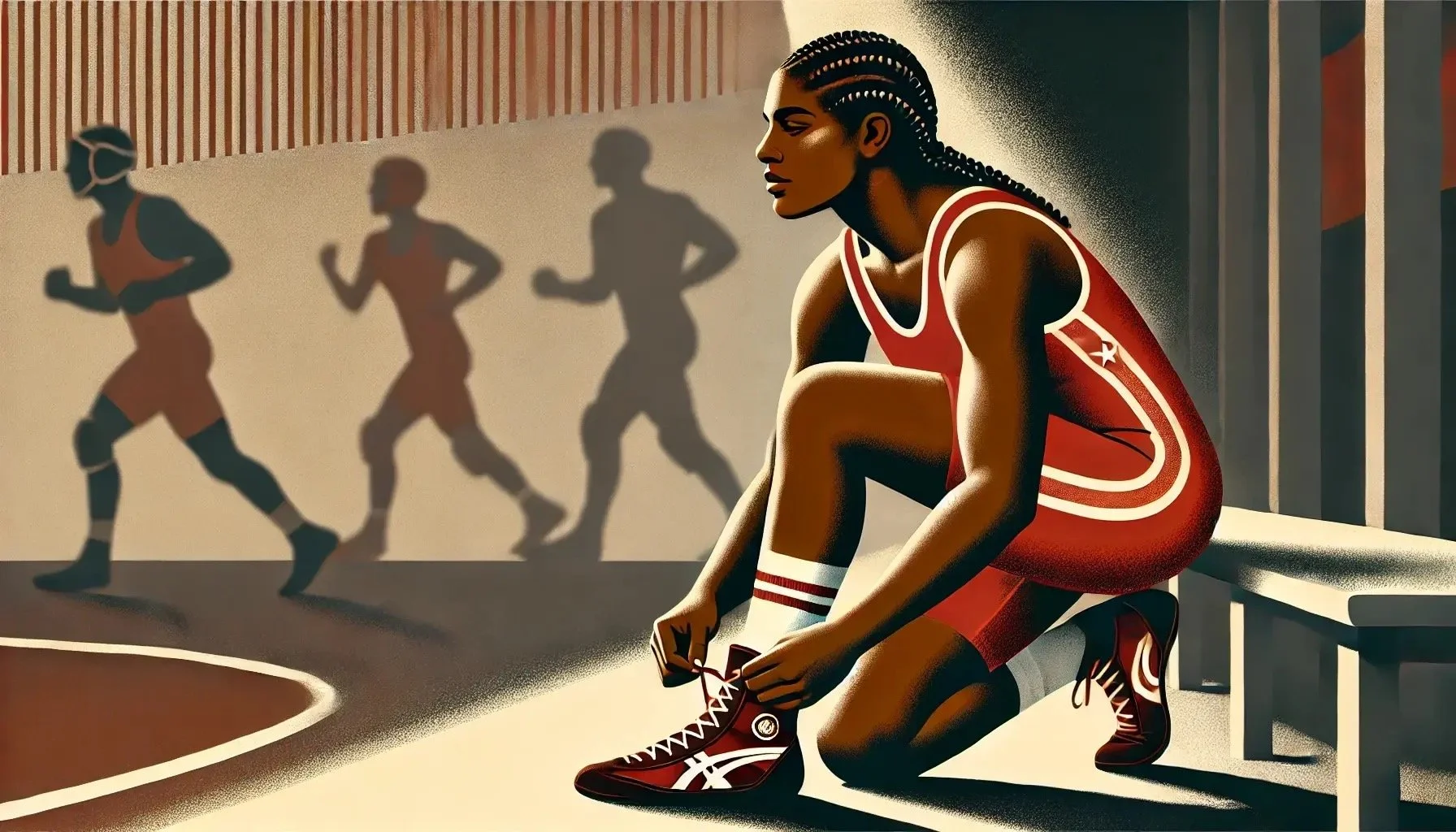Popular Topics
She Made Weight, But at What Cost?
You hug her after weigh-ins. She made it. She’s relieved—you’re relieved. But deep down, something feels off. Her eyes look tired. She barely spoke this morning. And you're not sure if you're more proud… or worried.
In wrestling, success is often measured in ounces. That number on the scale can determine everything: a starting spot, a shot at state, a future in the sport. For parents, it’s hard not to get caught up in it. We all want the best for our kids—to see them thrive, compete, win. But sometimes, the cost of “making weight” is invisible until it becomes too heavy to carry.
New York Just Changed Girls Wrestling Forever: Here’s Why It Matters
In a groundbreaking move, New York has become the first state in the U.S. to sanction girls' high school wrestling as freestyle instead of folkstyle. This historic decision aligns with the style used in women's college wrestling, providing a seamless pipeline for young athletes aspiring to compete at higher levels. Despite facing significant skepticism, New York's bold step marks a pivotal moment in the evolution of girl's and women's wrestling.
What You Aren't Doing That's Preventing Your Return to Sport
We are often our own worst enemies with healed injuries. When we start noticing the inevitable progression towards competition nears closer and closer, and we start loosing our heads. Those last, critical steps towards a full recovery are missed, and we become anxious and over focused on being back to sport in full. What we don't realize is, we already have the tools in our pocket to be ready for competition. It is not the first time we are competing! But are our bodies ready to adapt to the demands we must place on it?
High Level Training Myths
No matter what level you are on currently, reaching your next level or goal comes from introspection and learning how and where you can make improvements. However, as you start exploring where you can make changes as an athlete, it is important to not fall into the trap of what you expect the end results to be, or how you should look getting there. Here are my top 5 training myths for reaching a higher level.
Impact to Insight: Wrestling With Life After a Concussion
After sustaining a concussion during wrestling practice, I faced an uphill battle that impacted every aspect of my life—academics, athletics, and mental health. Simple tasks became overwhelming, and I had to relearn how to function, from navigating classes with sunglasses to rebuilding my confidence through physical therapy. I embraced resilience and found strength in small victories. Inspired by Helen Maroulis’ journey, I decided to share my own story.
5 Items You Shouldn't Forget for Competition
For every sport competition, we have our typical packing list of must haves: uniform, food, water, lucky socks. But the more we compete, the more we find ourselves in situations where we didn't have what we needed. And even though we try and buffer for most situations, not everyone knows what to pack just in case. Here are the 5 items you should never forget to bring with you to a competition.
Coaching Mental Strategies for Girls and Women’s Wrestling
Girls and women’s wrestling is thriving, and as more athletes step onto the mat, it’s crucial for coaches and parents to understand how to support their mental development effectively. While boys and girls share many of the same challenges in wrestling—overcoming setbacks, staying motivated, and managing competition stress—there are differences in how they process and respond to these experiences.
A Beginner’s Guide to Girls Wrestling
Girls wrestling is rapidly becoming one of the most exciting and empowering sports available, providing young girls and women the opportunity to grow both physically and mentally. Whether you’re the parent of a budding wrestler or a young athlete stepping onto the mat for the first time, learning the basics is crucial for building confidence and embracing the journey of wrestling.
Are You Coach Cupcake or Coach Drill Sergeant?
As a wrestling coach, have you ever wondered where you fall on the spectrum of coaching styles? Are you “Coach Cupcake,” always soft, overly accommodating, and hesitant to challenge your athletes? Or are you “Coach Drill Sergeant,” relentlessly demanding, sometimes to the point of breaking trust and respect?
Coaching for Mental Performance in Wrestling
In competitive sports, the mind is just as important as the body. Coaches know the importance of strength, conditioning, and technique, but mental performance is often an underdeveloped area for both the athlete and the coach. As times shift and we’ve become more aware of what creates a well rounded athlete ready to perform at high levels, so must we shift into a new phase of education for coaches. Integrating mindfulness and mental training into your team's routine can help athletes stay calm under pressure, perform with clarity, and build stronger team bonds.
What's Your Why?
What is your why? Can you even remember anymore? When you do something for so long, its almost inevitable for your 'why' to come into question. Your why is the reason behind your effort. It is what keeps you driven, if you don’t have a why you may be weak when things get hard.
I'm Falling Behind in Wrestling
I seriously, seriously appreciate the honesty that athletes approach me with when they want advice on injuries. I can hear the genuine fear of falling behind in their voices. Having faced that same fear myself, I want to offer insight into the proactive steps athletes can take, even when it’s tempting to sit on the sidelines and wait for clearance to wrestle again.
Beyond the Boys’ Club: Embracing a Unique Path for Women in Wrestling
The seeds were planted by the dreams and aspirations of women who aimed for gold medals on the world’s highest stages. They broke barriers and reshaped reality, showing how deeply wrestling could resonate with women. Just like a plant needs support to thrive, women’s wrestling needs allies to help it flourish and create space for women.
Why Freestyle is the Future for Girls Wrestling
January also marks the time of the year when women’s NCAA leaders gather for their annual convention to conduct NCAA committee business. My attention will focus on the potential vote approving women’s collegiate freestyle to become their 91st championship sport.
If they vote in favor of approval, it sets the stage for some compelling questions about the future of female wrestling. For example, can girls and women’s wrestling become a more independent and self-sustaining industry? More importantly, does freestyle wrestling offer the best opportunity for females to adopt a streamlined development and competition process based on one style of wrestling?
Elite in School and Sport: Forging Your Own Path
I’m a student-athlete at Choate Rosemary Hall, a highly demanding academic institution for high schoolers. I plan to continue pursuing a rigorous education and to compete at a high level of wrestling in college. Trying to balance both worlds can feel overwhelming. At times, it feels like I have to pick between my education and my sport. Limited opportunities for women to pursue both high-level academics and wrestling along with the challenges of being in a male-dominated sport have forced me to find unique ways to deal with stress, insecurity, and burnout.
What You Learn as the Only Girl on the Boys Wrestling Team
As the fastest growing sport in the US, wrestling is attracting new females to the sport. The US is well on it’s way to sanctioning girls wrestling in every state in order to have all-girls teams. However, while sanctioning is a work in progress and states are growing their participation numbers, this means many girls across the US who want to wrestle must compete against the boys. This poses a challenge for the athlete, the parents, and the coaches. This article chronicles two female athletes who were the only girls on their high school team. Forrest Molinari grew up wrestling in California, and continued her career to make world teams for Team USA. Rose Martines started wrestling her Junior year in Oregon, and completed her Senior year as the only female on her high school team. Neither athlete had a female wrestler come before them as the example for how to be the only girl on the boys team, they were the trend setters. As we continue to encourage girls to try this amazing sport, we are going to need the experiences of others to forge a path each generation that comes to the mat after us.


























